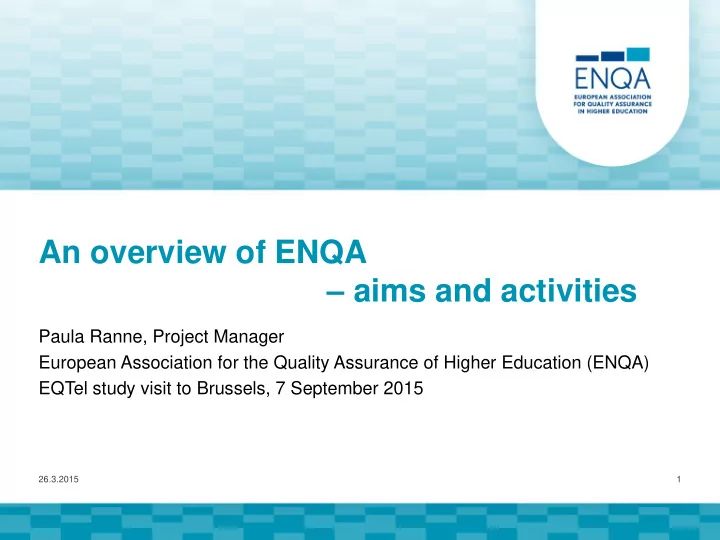

An overview of ENQA – aims and activities Paula Ranne, Project Manager European Association for the Quality Assurance of Higher Education (ENQA) EQTel study visit to Brussels, 7 September 2015 26.3.2015 1
Structure of the presentation 1. Introduction to the work of ENQA 2. Quality assurance in Europe and in the Bologna process replace txt View menu > Header and footer 2
European Association for Quality Assurance in Higher Education – ENQA • European Association for Quality Assurance in Higher Education (ENQA) • Umbrella NGO for European QA agencies • Network in 2000; association in 2004 • Move from Finland to Belgium 2011 • Structure: Board, General Assembly, Secretariat • 48 Full Members in 27 countries • 47 Affiliates in 30 countries • Celebration of 15 years of QA in 2015 replace txt View menu > Header and footer 3
European Association for Quality Assurance in Higher Education – ENQA • Membership criteria the Standards and Guidelines for Quality Assurance in the European Higher Education Area (ESG) – revised ESG adopted by the ministers in 2015 • Cyclical reviews of quality assurance agencies in the EHEA • Co-operation within E4 (European University Association, European Students Union, EURASHE) • Consultative member in the Bologna Follow-up Group since 2005 (QA as one pillar of EHEA since the beginning in 1999) • Founding member of the European Quality Assurance Register (EQAR) • Active in European and international projects replace txt View menu > Header and footer 4
Goals (2016-2020) • ENQA is representative of the diversity of quality assurance agencies throughout Europe • ENQA supports the continuous development of independent and trustworthy quality assurance agencies operating in line with agreed standards throughout Europe • ENQA provides advice and represents the interests of its members in the policy-making process Quality Assurance of Cross-border Higher Education (QACHE) 5
European quality assurance framework • QA: one action line in the Bologna Process (ministries of HE in Europe) since the beginning (1999) • 2005: Standards and Guidelines for Quality Assurance in the EHEA (ESG) – Proposed by the E4 Group (ENQA, ESU, EUA, EURASHE = the stakeholders, not ministries! ) • 2008: European Quality Assurance Register for Higher Education (EQAR), established by E4 list of “trustworthy agencies” • 2012: Decision to revise the ESG by 2015 – updating taking account of developments since 2005 – clarification – undertaken by the stakeholders – Revised version approved by the ministers in May 2015 10.9.2015 replace txt View menu > Header and footer 6
Main principles for QA in Europe • Higher education institutions have primary responsibility for the quality of their provision and its assurance • QA responds to the diversity of HE systems, institutions and programmes (as well as of agencies: • QA supports the development of a quality culture • QA involves stakeholders and takes into account the expectations of all stakeholders and society 10.9.2015 replace txt View menu > Header and footer 7
Main principles for QA in Europe cont. • Independence of QA agencies (not parts of the ministry) • Provides transparent and independent information on the quality of HEIs and programmes but is it accessible and easy to use? • External and internal QA build on each other (one is not complete without the other) 10.9.2015 replace txt View menu > Header and footer 8
Quality Assurance in the Bologna process ENQA’s role: • ENQA aims to have a stronger role in the development of QA ensuring that ENQA supports internal quality assurance and the development of quality culture • ENQA aims to support the creation of a quality (assurance) culture, where the importance of quality assurance will be accepted as an important element in constantly improving the education provision (and not as an external “control” or useless bureaucracy!) while the primary responsibility of QA lies with the institutions 10.9.2015 replace txt View menu > Header and footer 9
Remaining challenges in Europe • Governments need to look into why (if) they do not have an ESG compliant quality assurance agency at the moment, and what would be required to establish one. • The revised ESG may impose legal changes in some countries, and therefore their effective implementation depends not only on the quality assurance agencies and higher education institutions, but also on the policy makers ( This could for example concern the publication of review reports, which is currently not possible in some countries - i.e. reports with negative review outcomes are not being published). 10.9.2015 replace txt View menu > Header and footer 10
In the Bologna process, attention needs to be paid to: • Quality assurance of joint programmes, interdisciplinary programmes, e-learning (MOOCs ), internationalisation… • Recognition: Using quality assurance as a tool to facilitate recognition and to quality assure recognition practices • Awareness raising and implementation of the revised ESG • Quality assurance of cross-border higher education 10.9.2015 replace txt View menu > Header and footer 11
Some focus areas for 2015-2016 • Implementation of the revised Standards and Guidelines for Quality Assurance in the European Higher Education Area (ESG) • Development of the ENQA reviews and their revision to ensure their usefulness for all agencies appropriate to their state of development (revision of the review process) • Cross-border related quality assurance activities: ENQA Quality procedures project on internationalisation Working group on QA and recognition QACHE project • Workshop on QA and e-learning in December replace txt View menu > Header and footer 12
Thank you!
Recommend
More recommend